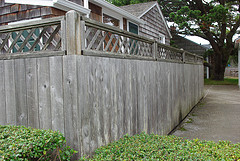What is the Best Kind of Privacy Fencing?
Fences come in many styles and serve many purposes. If privacy is what you’re looking for, there are a variety of options to fit your home. A privacy fence can keep peering eyes away from your home and yard, and is especially useful in warm areas with pools and Jacuzzis, like Los Angeles. In addition, a fence can also conceal eyesores in neighboring yards and surrounding areas.
Though you can DIY the installation of some types of fencing, if you want the fence to hold up when exposed to the elements and last as long as possible, it’s best to hire a professional fence contractor. The right fence installation will not only provide the privacy you’re looking for, it will also enhance the look of your yard and add value to your home.
What Type of Material Should I Use?
Most fencing materials can serve as privacy fencing, so you have to consider the pros and cons of each material. Common types of wood used for fencing include pine, spruce, redwood, cypress and cedar. These should be treated with weather-, rot- and pest-resistant sealants. However, wood requires routine upkeep and should be stained or painted every 2 or 3 years by a professional painter.
Alternatively, vinyl and composite materials can be used instead of wood. They can be made to look similar to wood but won’t warp or rot over time, and require almost no maintenance, though they tend to cost more.
If you select wood or a wood alternative, the two main styles that will provide privacy are board-on-board and stockade. Board-on-board has an overlapping panel which provides complete privacy and makes the fence sturdier, though the extra material causes the price go up. Stockade consists of tightly-placed panels that leave no space between each panel, though over time the panels can warp and expose gaps in the fence.
Concrete fences also provide great privacy, though it takes a special knack to select a design that doesn’t seem too overwhelming or constricting. Additionally, there are synthetic concrete options that are easier to install than real concrete and less expensive though these have the same look and feel as concrete.
Green Alternative to Fencing
Aside for fences, hedges are a great, green alternative. These plants will not only keep your yard secluded and private but they also add a nice, natural, aesthetic touch. The downside, however, is that they require watering and pruning and may take time to grow into proper privacy-providing fences.
Tips
Before you build a fence, check with your local zoning department to find out what kind of fence you are allowed to build in your area. Some codes limit the height of the fence to 6 or 8 feet, while others regulate the fencing material and location. One advantage of natural fences such as bushes and hedges is that they are often exempt from the fencing regulations and can be grown to whatever height you desire.
Be sure to get the green light for your fence project from your homeowners association, as well.
Privacy fences are a great way to maximize your outdoor space and provide a carefree environment. Contact an expert contractor to help select the best fence for your property and needs and have it installed correctly.
Updated March 27, 2018.
Looking for a Pro? Call us (866) 441-6648

Fencing Average Costs
Fence Contractors Experiences

New Cedar Fence Lets Our Dog Get His Exercise

My New Fence Features Excellent Workmanship




